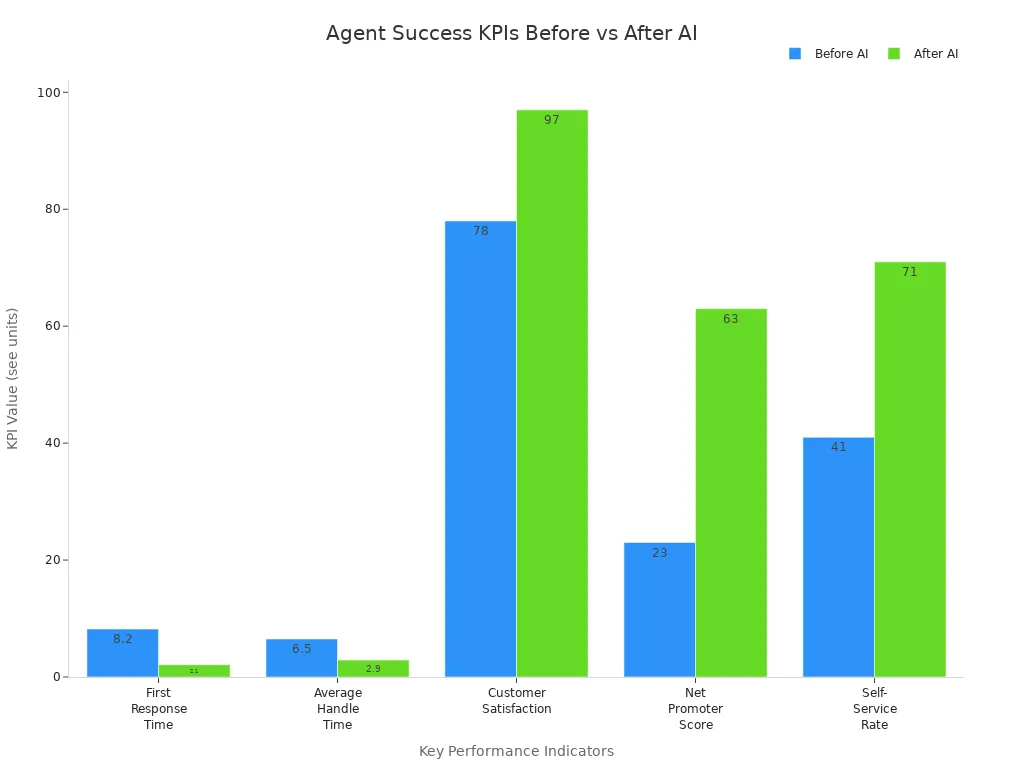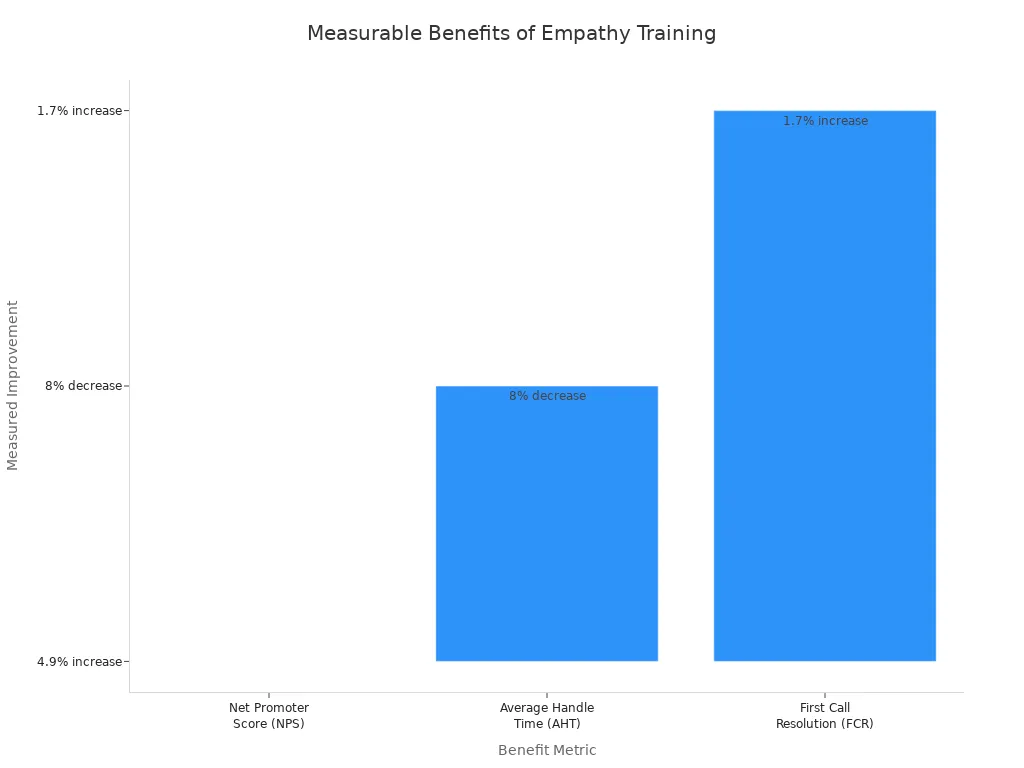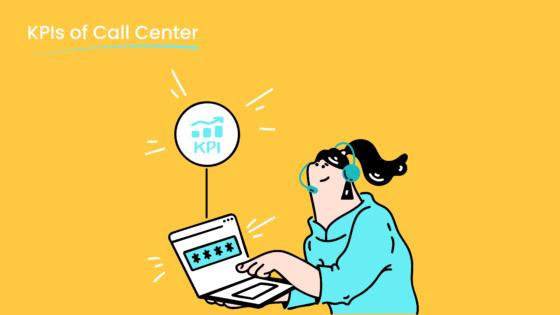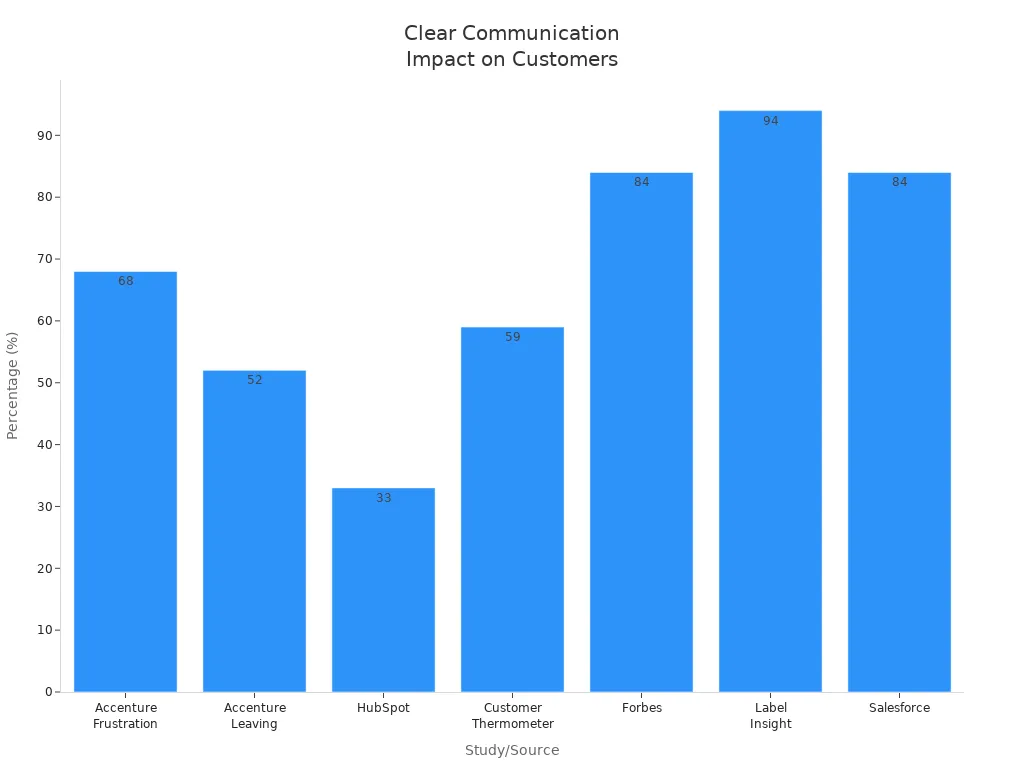Key Habits of Successful Customer Assistance Agents

You know how much impact a strong habit can have on your work as a customer assistance agent. Good habits help you solve customer issues faster and keep people happy in every customer service situation. Whether you work in retail, gaming, or remote customer service, you see how these habits make your day easier and boost results for customers. Sobot AI and the Sobot call center give you tools that support you every step, from handling customer support to managing remote customer service tasks. Check out the difference technology makes:

Sobot AI helps customer service agents reduce first response time by 74% and raise customer satisfaction to 97%. You get a unified workspace, smart call routing, and AI-powered chatbots that handle most customer questions. These facts show how the right solution can make remote customer service easier for you and better for every customer.
Empathy

Definition
Empathy means you put yourself in the customer’s shoes. You try to feel what they feel and understand their point of view. In customer service, empathy is one of the most important skills you can have. It helps you connect with people, even when you talk to them through a screen or over the phone. When you use empathy, you listen to customer needs and show that you care about their problems. This skill is a big part of emotional intelligence and helps you build strong customer relationships.
Why It Matters
Empathy changes the way you handle customer service interactions. When you show empathy, you build trust and make customers feel valued. This leads to better customer satisfaction and stronger customer relationships. Research shows that empathy in customer service helps you:
- Build trust and rapport, which increases customer loyalty.
- Calm down tough situations by showing you understand customer needs.
- Make customers feel heard, which improves the customer experience.
- Find hidden problems by listening closely during customer interactions.
- Reduce customer churn by offering solutions that fit customer needs.
A study found that when you use empathy, customers feel more satisfied and are more likely to come back. Companies that train agents in empathy see a 4.9% increase in Net Promoter Score (NPS) and an 8% drop in average handle time. You can see the difference in this chart:

How to Improve
You can grow your empathy skills with practice. Try these tips:
- Listen carefully to every customer. Focus on what they say and how they feel.
- Use simple words to show you care, like “I understand how you feel.”
- Ask follow-up questions to learn more about customer needs.
- Join role-playing or emotional intelligence workshops to boost your customer service skills.
- Use technology, like Sobot’s unified workspace, to see all customer information in one place. This helps you understand the full story and respond with empathy.
When you work on empathy, you make every customer service interaction better. You help customers trust you and feel good about their experience. That’s how you become a top customer service agent.
Clear Communication

You can’t deliver great customer service without clear communication. When you speak or write clearly, you help customers understand what’s happening and what to expect. This skill keeps misunderstandings low and trust high. Studies show that 68% of customer frustration comes from unclear communication, and 84% of customers say clear communication builds trust (Forbes). Take a look at these numbers:

Verbal Skills
When you talk to customers, use simple words and a friendly tone. Speak slowly and check if the customer understands. Repeat important points. Ask questions like, “Does that make sense?” or “Can I help with anything else?” This keeps the conversation smooth and helps you solve problems faster. Good verbal skills help you calm upset customers and show you care about their needs.
Written Skills
Writing matters just as much as talking. In customer support emails or chat, use short sentences and clear instructions. Avoid jargon. Break information into steps or lists. Always check your spelling and grammar. A well-written message can turn a confusing situation into a positive customer experience. Customers trust you more when your writing is easy to follow.
Tools and Technology
You don’t have to do it all alone. Sobot’s unified workspace brings all your customer communication—live chat, chatbot, social media, and ticketing—into one place. This makes it easy to keep track of every customer conversation and respond quickly. Omnichannel solutions let you switch between channels without losing information. Features like AI responses, rule-based triggers, and multi-language support help you deliver fast, effective communication. These tools boost your customer service skills and make your job easier.
Tip: Use communication tools to send clear, timely messages. This helps you avoid confusion and builds trust with every customer.
| Study/Source | Key Finding |
|---|---|
| Accenture | 68% of customer frustration is due to lack of clear communication. |
| Forbes | 84% of customers believe clear communication builds trust. |
| Label Insight | 94% of customers are loyal to companies transparent in communication. |
Clear communication is the heart of customer service. With the right skills and tools, you can create a better customer experience every time.
Problem-Solving
Great customer service always starts with strong problem-solving. When you help a customer, you face new challenges every day. You need to find the right solution fast, keep the customer happy, and make sure the issue does not come back. Let’s look at how you can boost your problem-solving skills and deliver better results.
Approach
You want to solve problems quickly and keep customer satisfaction high. Top agents use a few simple steps:
- Listen to the customer and understand their needs.
- Stay calm, even if the customer feels upset.
- Ask questions to get all the details.
- Think about possible solutions before you act.
- Use empathy and emotional intelligence to connect with the customer.
- Know when to ask for help or escalate the issue.

Sobot’s Voice/Call Center gives you tools to make this easier. With smart call routing and a unified workspace, you see all the customer’s information in one place. This helps you understand the problem and find the best solution fast.
Techniques
You can use different techniques to improve your problem-solving. Here are some that top customer service agents use:
- Anticipate common issues and prepare answers.
- Use role-playing and real-life case studies to practice.
- Work with AI-powered tools that suggest solutions in real time.
- Stay up to date on troubleshooting best practices.
- Combine soft skills like empathy with technical knowledge.
AI-powered features in Sobot’s platform help you handle routine tasks, so you can focus on complex problems. For example, Sobot’s AI chatbots answer simple questions, while you work on bigger issues. This means faster response times and better customer satisfaction.
Here’s how AI solutions have helped companies solve problems faster:
| Company | Industry | AI Solution | Impact on Issue Resolution Time |
|---|---|---|---|
| Vodafone Germany | Telecommunications | AI-powered voice bots | 20% reduction in handling time; 40% calls handled by bots; 24/7 support |
| Hunter Apparel Solutions | Manufacturing | AI-driven workflow automation | 4x faster customer response; improved SLA adherence |
| Crescendo.ai | Customer Service Automation | Automated email resolution system | Resolves up to 90% of email tickets in minutes |
Tip: Use your tools and training to suggest solutions before the customer asks. This shows you care about their needs and builds trust.
Continuous Learning
Problem-solving never stops. You can always get better by learning from each customer service experience. Try these ideas:
- Join training sessions and workshops.
- Practice with interactive simulations and group discussions.
- Ask for feedback from your team and customers.
- Review real cases, like the Weee! story. Weee! used Sobot’s flexible IVR and multilingual support to cut resolution time by 50% and raise customer satisfaction to 96%. You can read more about their success here.
When you keep learning, you improve your problem solving skills and help more customers every day. Sobot’s analytics and AI-powered training give you real-time feedback, so you always know how to get better.
Adaptability
You face new challenges every day in remote customer service. Customers expect quick answers, friendly support, and solutions that fit their needs. To excel in remote customer service, you need adaptability. This skill helps you adjust to changes, learn new tools, and keep up with customer expectations.
Remote Customer Service
Remote customer service means you help customers from anywhere, often at home. You might work in a call center, chat online, or answer emails. Every customer is different. Some are happy, some are frustrated, and some need extra help. You must adapt your approach for each situation.
Here’s why adaptability matters in remote customer service:
- You handle customer questions and problems without face-to-face contact.
- You represent your company and leave a lasting impression.
- You deal with many personalities and situations every day.
- The pace is fast, and no two customer interactions are the same.
- Your ability to adapt affects customer satisfaction and loyalty.
Sobot’s omnichannel solutions make it easier to excel in remote customer service. You get a unified workspace, smart routing, and AI-powered tools that help you switch between channels and respond quickly. These features support work-from-home customer service agents who need to stay flexible and efficient.
Handling Change
Change happens all the time in customer service. New technology, new processes, and new customer needs appear often. You must learn quickly and stay positive. Industry reports show that 79% of contact center agents say AI assistants help them solve problems faster and reduce burnout. AI tools suggest responses and guide you in real time, so you can focus on building relationships with customers.
Companies use generative AI and automation to help agents handle change. These tools reduce your workload and let you focus on customer experience. You become a “superagent” with advanced support, ready to meet any challenge. Sobot’s platform gives you access to these smart tools, so you can adapt and excel in remote customer service.
Tip: Stay open to learning new skills and using new technology. This helps you keep up with changes and deliver better customer service.
Flexibility
Flexibility means you can change your work style to fit new situations. You might switch from chat to phone, handle different types of customer requests, or adjust your schedule. Flexible agents respond quickly to changing customer needs and trends.
Adaptability helps you understand and meet customer expectations. You build trust and loyalty by delivering products and services that fit what customers want. Companies that focus on flexibility and customer feedback see higher customer satisfaction and stronger relationships.
| Benefit of Adaptability | How It Helps You in Remote Customer Service |
|---|---|
| Quick response | You solve customer problems faster |
| Positive attitude | You handle tough situations calmly |
| Learning new skills | You keep up with technology and trends |
| Customer focus | You build trust and loyalty |
Sobot’s unified workspace and AI-powered features support flexibility for work-from-home customer service agents. You can switch channels, manage tasks, and keep customer information organized, all in one place.
Adaptability is your key to excel in remote customer service. You stay ready for anything, keep customers happy, and grow your skills every day.
Time Management
You know how busy a day in customer service can get. Customers expect quick answers and solutions. If you want to keep up, you need strong time management skills. Good time management helps you stay organized, reduce stress, and deliver better customer service every time.
Prioritization
You face many tasks in customer service. Some issues need your attention right away. Others can wait. Prioritization helps you decide what to do first. The Eisenhower Matrix is a simple tool that lets you sort tasks by urgency and importance. You focus on urgent customer problems first, then handle less critical requests. This method keeps you on track and helps you avoid distractions.
Did you know that 46% of customers expect replies within four hours, and 12% want answers in just 15 minutes? Almost half of customers hope for a solution on the first contact. When you prioritize well, you meet these expectations and improve customer satisfaction. You also lower stress and avoid burnout.
Workload Balance
Balancing your workload is key in customer service. If you take on too much, you feel overwhelmed. If you do too little, you lose focus. Studies show that agents who manage their time well have utilization rates between 75% and 85%. This balance keeps you productive without burning out.
Try using the Pomodoro Technique. Work for 25 minutes, then take a short break. This keeps your mind fresh and helps you stay focused on customer needs. Inbox Zero is another strategy. Keep your email inbox clear by checking messages at set times and using filters. You respond to customers faster and never miss important requests.
Tools for Efficiency
You don’t have to manage everything alone. Sobot’s automation and analytics features make your job easier. Sobot uses AI to handle routine customer inquiries, so you can focus on complex issues. The platform supports omnichannel communication, letting you switch between chat, email, and phone without losing track of customer information.
Here are some ways Sobot helps you manage time:
- AI chatbots answer simple questions, freeing you up for bigger problems.
- Real-time monitoring shows where you spend your time and helps you spot bottlenecks.
- Analytics give you insights into customer behavior and agent performance.
- Automated quality assurance provides instant feedback and coaching.
Other tools like Time Doctor track your tasks and show where you can improve. CRM systems and ticketing platforms automate routine work and keep customer data organized. These tools help you respond faster and deliver better customer service.
Tip: Use automation and analytics to save time and reduce stress. You’ll help more customers and feel more confident in your customer support role.
| Tool/Technique | How It Helps You in Customer Service |
|---|---|
| Pomodoro Technique | Keeps you focused and prevents burnout |
| Inbox Zero | Ensures timely responses to customer emails |
| Sobot Automation | Handles routine tasks and improves efficiency |
| Analytics | Tracks performance and finds improvement areas |
Effective time management means happier customers, lower costs, and better results for you and your team.
Customer Service Mindset
A strong customer service mindset sets you apart in every customer interaction. You focus on customer needs, build trust, and create lasting customer relationships. This mindset helps you deliver good customer service, even when things get tough. Let’s look at what makes this mindset so important.
Positive Attitude
You bring a positive attitude to every customer interaction. This means you stay patient, friendly, and ready to help. When you show a positive mindset, you make customers feel welcome and valued. You solve problems calmly and always look for ways to help. A positive attitude spreads to your team and lifts everyone’s morale.
- A positive customer service mindset helps you connect with customers and solve their problems.
- You create a great customer experience, which leads to higher customer satisfaction and loyalty.
- Customers remember good customer service and come back again.
- Your attitude can turn a frustrated customer into a loyal fan.
A positive mindset also helps you handle stress and stay motivated. Companies that recognize and support their teams see higher morale and better results. When you feel good about your work, you give exceptional customer service every day.
Responsibility
You take responsibility for every customer interaction. This means you own the problem and work hard to find a solution. You listen to customer needs and make sure you follow through. Good customer service starts with being accountable and honest.
- You build trust by keeping your promises and fixing mistakes quickly.
- Customers appreciate when you take action and care about their needs.
- Taking responsibility helps you learn and grow your customer service skills.
When you use tools like Sobot’s unified workspace, you keep track of every customer request. This helps you stay organized and deliver good customer service. You show customers that you care about their experience and want to help.
Tip: Always follow up with customers after solving their problems. This shows you care and builds stronger customer relationships.
Teamwork
You can’t deliver good customer service alone. Teamwork is key. When you work with others, you share ideas, solve problems faster, and support each other. Research shows that teams who work together give better service and keep customers happy. For example, companies that use teamwork see higher productivity and better customer outcomes (Harvard Business Review).
- Teamwork helps you learn from others and improve your customer service skills.
- Sharing best practices leads to more effective communication and faster solutions.
- When you support your team, everyone delivers good customer service.
Sobot’s platform makes teamwork easy. You can share notes, track customer interactions, and learn from your team. AI tools help you find answers and improve your skills. When you work together, you create a culture of good customer service and meet customer needs every time.
Remember: Great teams build trust, solve problems, and create exceptional customer service. Your teamwork shapes every customer experience.
Product Knowledge
You can’t deliver great customer service without strong product knowledge. When you know your company’s products inside and out, you answer questions faster and help customers feel confident. Let’s break down how you can build and share your product expertise.
Learning
You start by learning everything about your products. This means you understand features, benefits, and common issues. Companies that invest in agent training see better first-contact resolution rates. Studies show that poor training and weak internal knowledge management lead to low first-contact resolution. When you get regular training on product details and troubleshooting, you solve customer problems faster and improve satisfaction.
Tip: Use a centralized knowledge base to find answers quickly. Sobot’s unified workspace gives you instant access to product information, customer history, and FAQs. This helps you resolve issues on the first try and keeps customers happy.
Here’s what helps you learn faster:
- Attend product training sessions.
- Explore the company’s knowledge base.
- Practice with real-life scenarios.
- Ask questions during team meetings.
Staying Updated
Products change all the time. You need to stay updated so you can give accurate advice. Companies use ongoing training, newsletters, and meetings to keep agents informed. Advanced tools like CRM systems and workforce management software also help. When you use Sobot’s platform, you get updates and training modules right in your workspace.
Agents who stay updated deliver better customer service. Continuous training means you know about new features and fixes. Transparent communication builds trust and keeps you motivated. CRM tools automate routine tasks and give you quick access to customer data. Companies using these tools see a 27% increase in customer retention (source). AI chatbots handle simple questions, so you can focus on complex customer needs. IBM found that AI can boost customer satisfaction by 89% (source). When you keep learning, you help customers faster and improve their experience.
Sharing Insights
Sharing what you know makes the whole team stronger. You can talk about product updates in meetings or send tips in group chats. Best practices include building a searchable knowledge base, using learning management systems, and holding regular cross-department meetings. Microlearning—short training modules—keeps you updated without feeling overwhelmed.
Here are some ways to share insights:
- Join focus groups to discuss product changes.
- Fill out surveys to spot knowledge gaps.
- Help teammates by answering questions.
- Celebrate agents who show strong product knowledge.
Note: Companies that encourage knowledge sharing see higher customer satisfaction and faster issue resolution. Sobot’s platform lets you share notes, track updates, and learn from others in real time.
| Best Practice | How It Helps You and Your Team |
|---|---|
| Centralized Knowledge Base | Quick access to accurate product info |
| Microlearning Modules | Easy updates without information overload |
| Cross-Department Meetings | Breaks down silos and keeps everyone informed |
| Feedback Loops | Improves training and fills knowledge gaps |
When you learn, stay updated, and share insights, you become a trusted expert in customer service. Customers get better answers, and your team works smarter together.
Self-Care
Taking care of yourself is just as important as helping your customers. If you want to give great customer service, you need to feel your best. Let’s look at how you can manage stress, keep a healthy work-life balance, and find support when you need it.
Stress Management
Customer service can be stressful. You talk to many people every day, and some situations can feel tough. Studies show that jobs like customer service often lead to burnout if you don’t practice self-care. Mindfulness and relaxation techniques, like deep breathing or short walks, help lower stress and boost your mood. Many experts say that taking regular breaks, celebrating small wins, and asking for help when you feel overwhelmed can make a big difference. Mindfulness-based self-care programs have helped people in similar roles feel less anxious and more satisfied at work.
Tip: Try a quick breathing exercise or stretch between customer calls. Even a few minutes can help you reset.
Work-Life Balance
You need time for yourself outside of work. Research shows that flexible schedules, wellness programs, and respecting work hours help reduce stress and make you happier at work. Companies that support work-life balance see less burnout and higher job satisfaction. When you have time to relax, you come back to your customer service role with more energy and patience. Sobot’s cloud-based tools let you work from anywhere, making it easier to fit your job into your life.
| Work-Life Balance Tips | How It Helps You |
|---|---|
| Take regular breaks | Reduces fatigue |
| Set clear work hours | Protects your personal time |
| Use flexible scheduling tools | Supports your daily routine |
Support Resources
You don’t have to handle everything alone. Many companies offer support resources like wellness programs, counseling, or team check-ins. Sobot’s unified workspace helps you stay organized, so you feel less stressed and more in control. If you ever feel burned out, talk to your manager or a teammate. Sharing your feelings and asking for help is a sign of strength, not weakness.
Remember: Taking care of yourself means you can give better customer service and help more customers every day.
Continuous Improvement
You want to keep growing in customer service. The best agents never stop learning. Continuous improvement helps you stay sharp, meet new challenges, and give better support to every customer.
Feedback
Feedback is your secret weapon. When you listen to what customers say, you find ways to get better. Companies like Southwest Airlines and Ritz-Carlton show that giving agents the power to act on feedback leads to happier customers and more creative solutions. You can use feedback from surveys, reviews, or even quick chats after a call. Sobot’s analytics make it easy to track customer feedback and spot trends. You see what works and what needs to change. This helps you build stronger customer service skills and keeps your team moving forward.
Tip: Ask for feedback often. Celebrate small wins and learn from mistakes. Every comment is a chance to improve.
Training
Training keeps you ready for anything. You learn new tools, practice soft skills, and stay updated on best practices. Sobot offers ongoing training and real-time feedback through its platform. You get AI-powered scorecards, performance tracking, and targeted lessons. This helps you handle tough customer service situations and stay ahead of industry changes. Studies show that regular training boosts morale and lowers turnover. When you train often, you feel more confident and deliver better customer experiences.
Here are some ways to make training work for you:
- Join workshops and team sessions.
- Use AI tools for real-time coaching.
- Share what you learn with your team.
Self-Reflection
Self-reflection helps you grow. Take time to think about your day. What went well? What could you do better? Many top agents use journals or quick notes to track their progress. Sobot’s analytics let you review your calls and chats. You see your strengths and find areas to improve. This habit builds a strong foundation for long-term success in customer service.
Remember: Continuous improvement is not just about fixing problems. It’s about always looking for ways to make every customer interaction better.
You can become a top customer assistance agent by building strong habits. Industry surveys show the best customer service agents:
- Show empathy and listen closely.
- Understand what customers want.
- Use the right words and say “thank you.”
- Adapt to change and remove obstacles.
- Take ownership and share product knowledge.
Remote customer service gets easier when you use tools like Sobot’s unified workspace. Keep learning, focus on customer satisfaction, and help your team grow. Start today—your next great customer experience is just one habit away!
FAQ
What makes a customer assistance agent successful?
You succeed as a customer assistance agent when you show empathy, communicate clearly, and solve problems fast. Top agents use tools like Sobot’s unified workspace to manage customer support across channels. Studies show that 96% of customers value quick, friendly service (Salesforce Research).
How does Sobot help with remote customer service?
Sobot gives you a unified workspace, AI-powered chatbots, and smart call routing. These features help you handle remote customer service tasks from anywhere. You can switch between chat, phone, and email without losing track of customer information. This makes your job easier and keeps customers happy.
Why is product knowledge important for customer support?
When you know your products well, you answer questions faster and build trust. Sobot’s platform lets you access product info and customer history in one place. This helps you solve problems on the first try and improves customer satisfaction.
How can I manage stress as a customer assistance agent?
Try short breaks, deep breathing, or quick walks. Sobot’s automation features reduce repetitive work, so you can focus on helping customers. Companies that support self-care see lower burnout rates and higher job satisfaction. Remember, taking care of yourself helps you deliver better customer service.
Tip: Use Sobot’s analytics to track your workload and spot areas for improvement. This helps you balance tasks and avoid stress.
See Also
How AI Agents Are Transforming Customer Support Services
Top Ten Strategies To Improve Live Chat Satisfaction
Effective Approaches For Managing Live Chat Representatives
